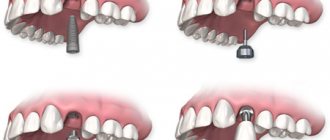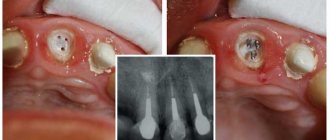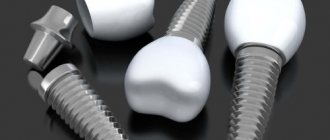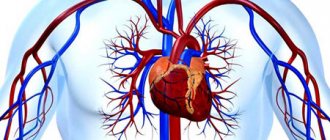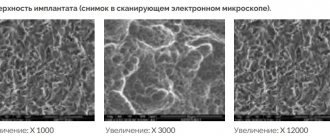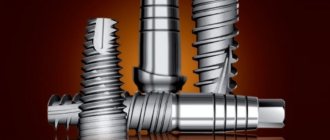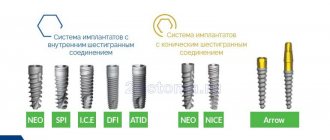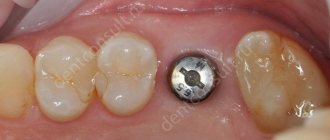MIS SEVEN are self-tapping implants, specially designed for operations on various types of bone. Their geometric design includes double compression threads (the thickness of the cutting edge increases from the apical part of the implant to the neck along the entire length of the implant body), three spiral channels emanating from the apex, and micro-rings at the implant neck. All implants of the MIS implantation system are made from the world's most popular alloy for surgical dentistry and implantology, Ti 6Al-4V ELI (GRADE 23), sandblasted and acid-etched in accordance with a special surface treatment standard.
Specification of SEVEN implants
Conical shape of the SEVEN implant
The SEVEN implant has a conical shape, which ensures vertical and horizontal condensation of the implant bed during installation to achieve primary stability of the implant.
Double thread
The SEVEN double thread design allows for controlled installation of the implant, while creating moderate compression of the bone of the implant bed, and also improves bone-implant contact, accelerating the process of osseointegration and ensuring long-term clinical results. The thread diameter increases from the apex to the neck of the implant, in increments of 2.40 mm.
Micro rings
Microrings on the neck of the SEVEN implant significantly increase the area of contact between the implant and the bone in the cervical area of the implant bed, which in turn eliminates the risk of bone tissue resorption in the crestal region of the alveolar process.
Surface
All MIS implants are processed according to the SLA system. Surface roughness and micro-design are created by sandblasting and acid etching. The unique surface treatment technology of MIS implants has enabled millions of patients and clinicians to achieve excellent osseointegration results with long-term clinical success.
Internal hexagon
SEVEN implants have an internal hexagon type connection, which provides an excellent fit and comfortable positioning of the superstructure, and also ensures high and long-term aesthetics of the orthopedic structure. The hexagon diameter is 2.45 mm for standard and wide implants and 2.10 mm for narrow platform.
Spiral channels
Three spiral channels of the SEVEN implant, located in its apical part, provide its self-tapping properties and make the implantation procedure simple, controlled and safe.
Safe apex
The SEVEN implant has a safe and cutting apex, which allows for final adjustment of the direction of the implant during its installation.
What is an enterprise resource planning system?
ERP (Enterprise resource planning) is a special software solution for planning operations with existing and future resources, or more precisely, an operating process management system that operates with information about the company’s resources.
Typically, an ERP is part of a larger management information system that is at the forefront of simplifying routine operations by providing managers with insights and tools to facilitate critical internal business processes.
At the moment, this component is even more popular among large and small enterprises than classic MIS, since it is tailored for more specialized tasks.
Main functions of ERP systems:
- Accounting . Collect data and manage accounts receivable and payable, tax payments, payroll and time tracking. To track the status and manage accounting, ERP systems use special tools, which, as a rule, are created for a specific jurisdiction.
- Production . A common centralized interface for managing production processes: purchasing, budgeting, forecasting and planning. This makes it easier to work with suppliers and clients.
- Business analytics . Collection, storage and analysis of data that is generated during the operation of the enterprise to make more effective management decisions.
- Communication . A common database helps speed up work processes and improve employee discipline.
Scope of ERP
Who uses ERP systems?
Panorama research has shown that the majority of enterprises (more than 80%) are either in the process of implementation or are already using ERP systems, since a specialized solution is always a priority over a general one. This is mainly business in retail, logistics, production, distribution, finance, real estate and information technology. Recently, ERP solutions based on distribution registries have become popular: blockchain, Tangle, Hashgraph.
Depending on the scope of application, ERP covers the following:
- Finance : ledger, fixed assets, accounts payable and receivable, payments, financial consolidation, cash management and miscellaneous collections.
- Personnel : Recruitment, rostering, training, payroll, pensions, benefits, diversity management, retirement.
- Manufacturing : equipment, bill of materials, production processes and premises, operational process management, production and product quality control, product life cycle management, etc.
- Sales : pricing, order entry and fulfillment, checking the buyer's balance, communication capabilities, reporting, sales analysis, commissioning.
- Supply Chain : Planning, O2C, Product Configurator, Purchasing, Inventory, Warehousing, Claims Processing, (Receiving, Storage, Kitting, Packaging).
- Projects : Project and resource planning, costing, work breakdown, time and costs, billing, productivity units and activity management.
- CRM : marketing, sales, service, commissions, customer contacts, support.
- Data transfer : “self-service” interfaces for company employees (with different roles), suppliers and customers.
- Accounting : cost management, budgeting, costing.
Dimensions, diameters and model range of SEVEN implants
Narrow orthopedic platform of the Seven implant
* Seven implants with a narrow platform are equipped with built-in implant drivers.
Seven Standard Orthopedic Implant Platform
Wide orthopedic platform of the Seven implant
Cover screws* and healing abutments
Narrow orthopedic platform
| MC1-00330 | Height range: 2, 3, 4, 6, 8 mm MH-N2330 MH-N3330 MH-N4330 MH-N6330 MH-N8330 | Height range: 2, 3, 4, 5, 6 mm MH-52330 MH-53330 MH-54330 MH-55330 MH-56330 |
Standard orthopedic platform
| MC1-00375 | Height range: 3, 4, 5, 6 mm MH-03375 MH-04375 MH-05375 MH-06375 | Height range: 3, 4, 5, 6 mm MH-53375 MH-54375 MH-55375 MH-56375 |
Wide orthopedic platform
| MC1-00470 | Height range: 3, 4, 5 mm MH-W3500 MH-W4500 MH-W5500 | Height range: 3, 4, 5 mm MH-W3630 MH-W4630 MH-W5630 |
** Screws - plugs are colored according to the color coding of the platforms
Surgical protocols for installing SEVEN implants
Narrow orthopedic platform. Diameter 3.30mm
Standard orthopedic platform. Diameter 3.75mm
Standard orthopedic platform. Diameter 4.20mm
Wide orthopedic platform. Diameter 5.00mm
Wide orthopedic platform. Diameter 6.00mm
* The final cutter is not used for bone types 3 and 4 ** The sequence of preparation steps is shown using the example of an implant with a length of 13 mm. *** The recommended protocol for the implantation procedure cannot serve as a substitute for the opinion and professional experience of an implant surgeon.
MIS implants: turnkey price for 2022
The price for MIS implants will undoubtedly please you, especially if you are familiar with the prices for premium implantation systems made in Switzerland or the USA. The prices below are given based on an analysis of the price lists of clinics in the mid-price segment and economy class.
MIS implants: turnkey price
- with a metal-ceramic crown – from 35,000 rubles,
- with a ceramic crown – from 50,000 rubles,
- the cost of just the operation of 1 MIS implant (without crown and abutment) will be from 22,000 rubles.
Prices for complete absence of teeth - we have already said above that MIS implants are not suitable for implantation using the “All-on-4” method, which is used for permanent prosthetics of toothless jaws (and prosthetics using this method is carried out already 2-3 days after surgery) . But MIS implants are suitable for the usual two-stage implantation method, when in the first stage 4 implants are installed in a toothless jaw and a temporary removable denture is made. This stage will cost about 120,000 rubles.
You will wear a removable denture for about 3-6 months (that is, while the implants are implanted into the bone). After this time, a permanent metal-ceramic bridge prosthesis is made, which will cost on average another 180,000 rubles.
Turnkey prices for implants from other manufacturers –
- AlphaBio (Israel) – → with a metal-ceramic crown – from 35,000 rubles, → with a zirconium crown – from 50,000 rubles.
- Osstem (Korea) – → with a metal-ceramic crown – from 40,000 rubles, → with a zirconium crown – from 50,000 rubles.
- AstraTech (Sweden) – → with a metal-ceramic crown – from 70,000 rubles, → with a zirconium crown – from 80,000 rubles.
- Straumann (Switzerland) – → with a metal-ceramic crown – from 70,000 rubles, → with a zirconium dioxide crown – from 90,000 rubles.
- NobelBiocare (Switzerland) – → with a metal-ceramic crown – from 80,000 rubles, → with a zirconium crown – from 90,000 rubles.
How to choose the right implant type –
For more information about how implants from different manufacturers differ from each other, and what you need to pay attention to when choosing, read the article: “How to choose the right type of dental implant”
Final cutter
Standard sizes of final cutters for SEVEN implants
When using the final cutter, one should take into account its structure and geometric features, and as a consequence, the fact that the implant bed is lengthened (during its final formation) by the size of the apex of the final cutter. This must be taken into account during surgical planning. Below are the dimensions of the apexes of the final cutters based on the diameters of the implants.
* Recommended force when using the final cutter: 200 - 400 rpm.
* Shown in the video: the implant driver, as well as the form of external and internal packaging of the SEVEN implant are no longer used. They have been modified and improved. See section - SEVEN implant packaging
Surgical kit for implant placement SEVEN
History of origin
The implants are made in Israel. The history of MIS implants dates back to 1995. Almost immediately after their appearance in the dental services market segment, dental implants gained trust and wide popularity among dentists and their clients.
Dental implants are exported all over the world, including Asia, America, Germany, Italy and France. In total, implants are supplied to 75 developed countries.
The company today is a leading manufacturer of dental implants. Only new technologies are used in the manufacture of structures, and production is constantly modernized.
Every year the company produces over 2 million units of dental units. Many Russian clinics use Israeli implant systems from Israel. The high quality of implants has been appreciated by millions of people around the world.
SEVEN implant packaging
The double packaging system ensures the sterility and integrity of the implants. The internal packaging of the implant is specially designed to hold it in gloves and make it easier to remove the implant during surgery.
The outer bulb of each implant is labeled with a color-coded platform and the diameter and length of the implant.
What is the advantage compared to other systems?
If it is necessary to restore only one missing tooth, this remedy is very effective, for example, compared to a traditional bridge installation. First of all, this is explained by the fact that a standard bridge can only be attached to previously ground healthy teeth. At the same time, a process of bone loss occurs in the space under the bridge, as a result of which the patient faces a violation of aesthetics and the need for treatment of the supporting teeth, up to their complete removal and replacement of the bridge with a new one.
In the case of MIS implantation, only the missing tooth is restored, without the need to damage nearby teeth. In addition, the crown located on the device is designed to last longer than a conventional bridge. And with a well-performed operation, it is almost impossible to distinguish such an implant from a real tooth.
Once installed, implants can also become a reliable support and an effective alternative to removable and clasp dentures. They help maintain bone volume and protect adjacent teeth.
In general, compared to other types of prosthetics, this approach gives remarkable results, both from the functional and aesthetic sides, since it allows you to maintain the resulting type of restoration for a long time. This is made possible by using high-strength materials to produce an implant crown that is designed to last for decades.



